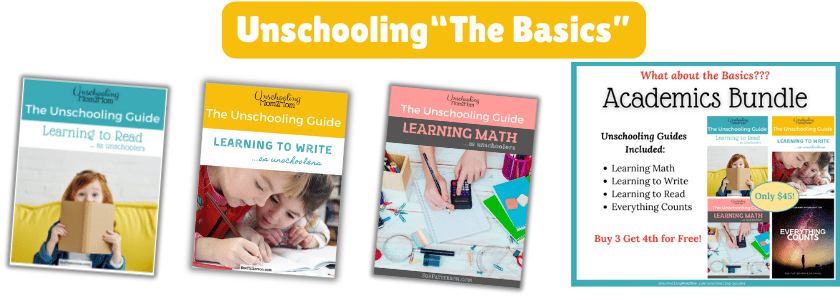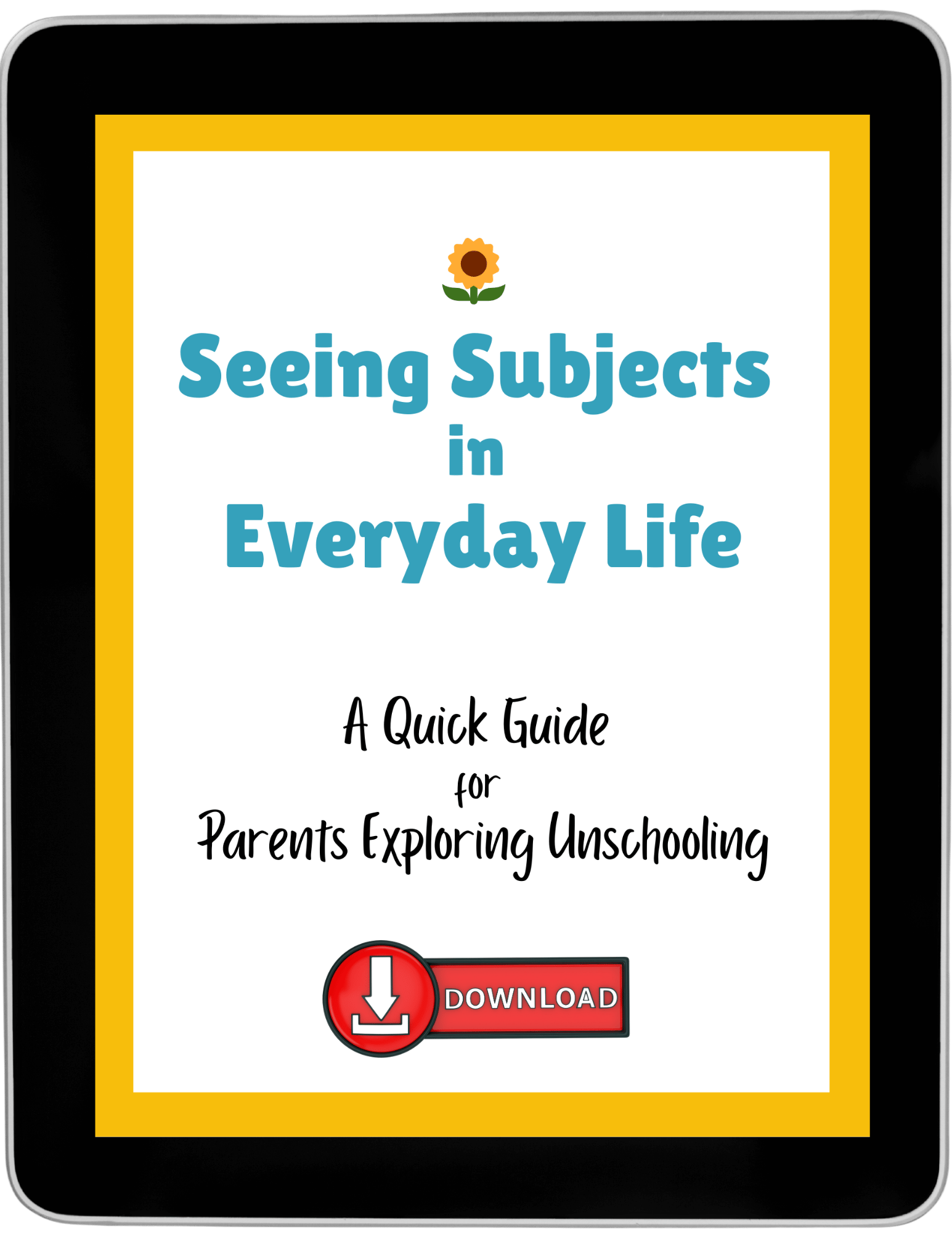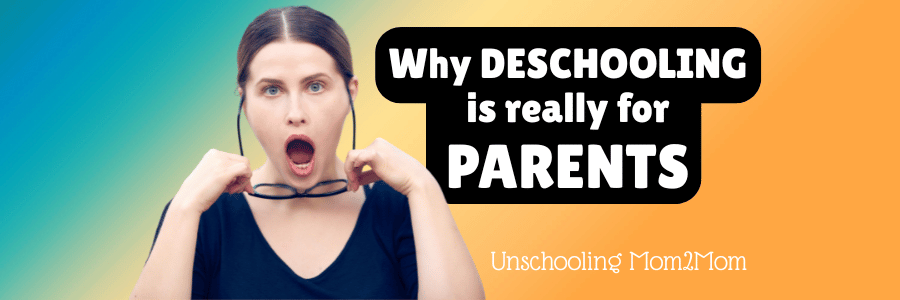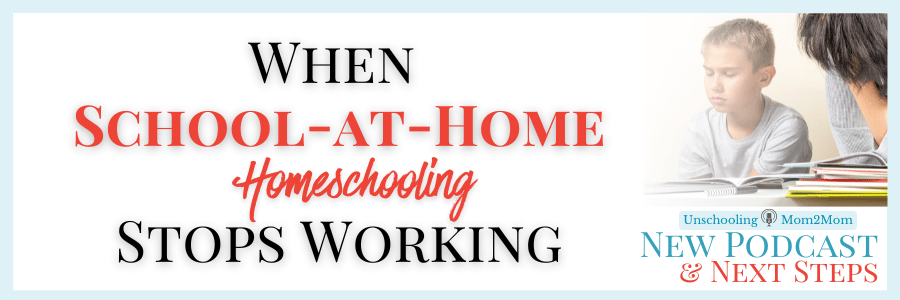Learning the Basics Without Curriculum: Reading, Math & More in Real Life
Everyday Life Is Full of “The Basics”
Here are just a few quick examples:
- 📖 Reading & Writing: texting, journaling, fanfiction
- ➗ Math: recipes, shopping, sports stats
- 🔬 Science: baking, gardening, YouTube experiments
- 🌍 History & Culture: movies, maps, family stories
- 🎨 Arts: music playlists, doodles, photography
✨ Want even more examples?
Grab my free PDF
“Seeing Subjects in Everyday Life” — it comes with a handy cheat sheet to help you spot learning everywhere.
“I Love Unschooling, But I Want My Kids to Know the Basics First”
Another oh-so-common thing I hear from parents as they’re embarking on their homeschooling adventures is this:
“I love unschooling, but I want the kids to have The Basics first.”
And while I completely understand the intention behind that statement, we have to pause and unpack it a little bit.
What Do We Mean by “The Basics”?
Different people mean different things. For some it’s learning to read fluently. Then that expands to spelling, and choosing reading for fun. For others it’s math skills — but how far? Multiplication? Algebra? Geometry? Writing often makes the list too, but again — where’s the line? A neatly written essay, or just being able to text in full sentences?
When we prioritize these “3 Rs” — reading, writing, arithmetic — as if they’re the single thread the entire tapestry of learning leans on… it’s worth asking: is that actually true?
Did We Need All Those “Basics”?
Think about it.
Did you learn important life skills today because you can still diagram sentences, or prove a geometry theorem, or write a perfect five-paragraph essay? Most of us spent years drilling those basics. And yet, how often do they really show up in our adult lives?
Unschooling invites us to step back and ask the deeper questions:
Do kids really need this?
Do they need it now?
Could they learn it differently, more naturally, if we don’t force it?
Redefining “The Basics” for Today
Here’s the other layer we don’t always think about: maybe “the basics” themselves need a refresh.
Take penmanship, for example. Do kids need to spend hours perfecting cursive in 2025? For some, handwriting will matter — for art, calligraphy, or personal notes. But for most of us, the real “basic” is clear communication, no matter the tool. That could mean typing, texting, voice-to-text, even creating a video message.
Or think about math. Is the real “basic” solving long division on paper? Or is it being numerate enough to budget, compare prices, calculate tips, or understand a news story about percentages and polls?
And what about skills that schools never labeled “basic” at all — but now feel more essential than cursive or memorizing capitals?
- How to find reliable information in a world full of search engines and misinformation.
- Critical thinking — not just solving problems, but knowing which questions to ask.
- Executive function — planning, prioritizing, staying flexible when things change.
- Emotional literacy — noticing your feelings, communicating them, and understanding others.
When we stop and look at life as it actually is today, it’s clear: “the basics” aren’t just the 3 R’s anymore. They’re the skills that help us navigate a constantly changing world, build healthy relationships, and keep learning long after childhood.
How Kids Learn the Basics Anyway
Here’s the part that feels unorthodox… maybe controversial… but at the same time, VERY reassuring. Kids do learn the basics. They just don’t always learn them the way we expect.
Reading shows up in gaming, texting friends, street signs, menus, subtitles, instructions.
Writing shows up in social media posts, fanfiction, lists, letters, emails.
Math shows up in cooking, allowance, sports stats, building, shopping, gaming economies.
The world constantly offers “basics” for free — and kids grab onto them when they’re meaningful.
✅ Try This Right Now
Pause for a moment and make a quick list of what you consider “the basics.”
Be honest — what skills are you worried your child won’t pick up if you don’t teach them first?
Then ask yourself:
- Do I actually use this skill in my own adult life?
- Could my child bump into it naturally, through daily life or interests?
- Am I withholding something joyful until this “basic” is mastered?
- Who is telling me, or why am I thinking I have to push for this before we go on to other things?
- Is the familiar timeline for learning serving my child or leftover from making the school system move smoothly?
This quick reflection helps you see whether “the basics” are really important to your child's learning foundation — or could you remove the pressure and wait a little bit to see what happens?
The Risk of “Basics First”
But when we wrestle it away from the kids, with our pronouncement of “basics first,” how kids hear this is often: you can’t follow your interests until you’ve earned it. It makes learning feel like a gatekeeper, instead of a natural part of life.
Have you ever had a child pick up a toy at the store, notice the word “Educational” on the box, and immediately say: “Nope! Don’t want that”? That usually happens with kids who’ve been through school or a more traditional, curriculum-heavy version of homeschooling. They’ve been taught to separate learning from living.
It’s like when parents say, “eat your dinner before you can have dessert.” Even if the meal is something they enjoy — like baked potatoes — it now feels like the chore they have to slog through just to get to what they really want. The “forbidden fruit” effect kicks in.
We’ve made kids think PLAY is the forbidden fruit. But play is actually where so much learning lives. Curiosity, problem-solving, creativity, persistence — all of those grow through play. By separating “education” from fun, we do kids a disservice. We tell them learning can’t be joyful, when in reality, the joy is what makes it stick.
Let’s not turn something natural, like reading, into something stressful.
A Better Way to Think About It
Instead of putting basics at the door and making kids knock, what if we open the door and invite them into all of it? What if WE walk through the door and see all the learning that’s happening in the activities they already enjoy without asking them to jump through some arbitrary hoops — just because that’s easier for us to see.
The basics and the “beyond basics” weave together in daily life.
Unschooling parents learn to trust that the basics will come along for the ride — while curiosity, connection, and confidence take the lead.
Your Next Step
If you’re nodding along but still want concrete reassurance, I’ve got you covered.
I’ve created a free PDF to help you get started. It will help you start to see from this unschooling perspective.
But if you need a little more help, my unschooling guides for Reading, Writing, and Math are all available too. Individually but at a discount if you need them all. I’ll link to that too. This bundle of guides will show you that unschooling just looks at The Basics differently. It reframes the starting point and the path to get there. I’ll leave links in the description and at the website, so you’ll have them.
Bottom line is: Unschooling doesn’t ignore the basics. It simply trusts that they’ll grow right alongside all the other important skills of life — in a way that makes more sense, and sticks longer, because it’s rooted in your child’s curiosity.
Grab this!
If you’re nodding along but still want concrete reassurance, I’ve got you covered.
I’ve created a free PDF to help you get started. It will help you start to see from this unschooling perspective.
Ready to Dive Deeper?
If you need a little more help, my unschooling guides for Reading, Writing, and Math are all available too.
Individually but at a discount if you need them all. I’ll link to that too. This bundle of guides will show you that unschooling just looks at The Basics differently. It reframes the starting point and the path to get there. I’ll leave links in the description and at the website, so you’ll have them.
Bottom line is: Unschooling doesn’t ignore the basics.
It simply trusts that they’ll grow right alongside all the other important skills of life —
in a way that makes more sense, and sticks longer, because it’s rooted in your child’














